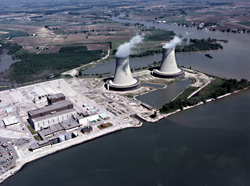"Senators Markey, Boxer and Sanders Introduce Legislation to Increase Safety at Nuclear Plants"
 U.S. Sen. Barbara Boxer (D-CA), Chairwoman of the Environment and Public Works CommitteeU.S. Senator Barbara Boxer (D-CA, photo at left), Chairman of the Senate Committee on Environment and Public Works (EPW), Senator Bernie Sanders (I-VT) and Senator Edward J. Markey (D-MA) introduced three bills today aimed at improving the safety and security of decommissioning reactors and the storage of spent nuclear fuel at nuclear plants across the nation.
U.S. Sen. Barbara Boxer (D-CA), Chairwoman of the Environment and Public Works CommitteeU.S. Senator Barbara Boxer (D-CA, photo at left), Chairman of the Senate Committee on Environment and Public Works (EPW), Senator Bernie Sanders (I-VT) and Senator Edward J. Markey (D-MA) introduced three bills today aimed at improving the safety and security of decommissioning reactors and the storage of spent nuclear fuel at nuclear plants across the nation.
The three bills address safety of spent fuel storage and decommissioning plans. They are entitled: Safe and Secure Decommissioning Act of 2014; Nuclear Plant Decommissioning Act of 2014 (see the bill, Sen. Sanders' press release, and a one-page summary); Dry Cask Storage Act of 2014. To learn more, see the press release at Sen. Markey's website.
The EPW Committee will hold and webcast a hearing entitled “Nuclear Reactor Decommissioning: Stakeholder Views” on Wed., May 14th, at 10 AM Eastern. Witnesses include CA and VT officials, and spokespeople from NRDC and NEI.
Please urge your two U.S. Senators to support these three bills. You can contact your Senators via the U.S. Capitol Switchboard at (202) 224-3121.





 May 13, 2014
May 13, 2014

